人教版初中英语wonder的高频考点、句型讲练
- 格式:docx
- 大小:13.32 KB
- 文档页数:3
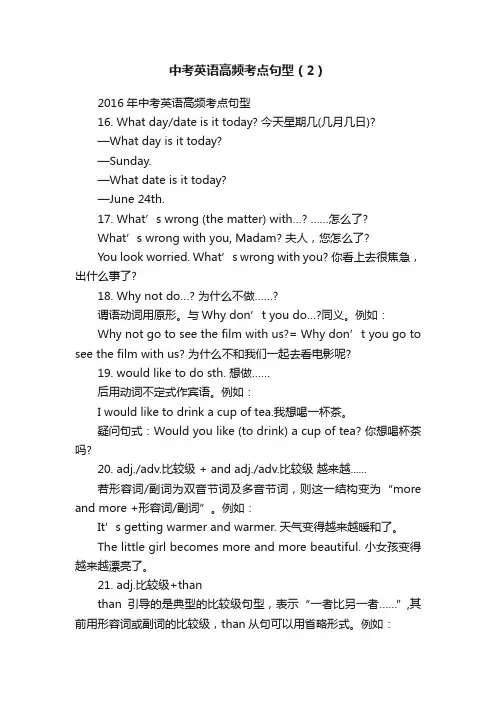
中考英语高频考点句型(2)2016年中考英语高频考点句型16. What day/date is it today? 今天星期几(几月几日)?—What day is it today?—Sunday.—What date is it today?—June 24th.17. What’s wrong (the matter) with…? ……怎么了?What’s wrong with you, Madam? 夫人,您怎么了?You look worried. What’s wrong with you? 你看上去很焦急,出什么事了?18. Why not do…? 为什么不做……?谓语动词用原形。
与Why don’t you do…?同义。
例如:Why not go to see the film with us?= Why don’t you go to see the film with us? 为什么不和我们一起去看电影呢?19. would like to do sth. 想做……后用动词不定式作宾语。
例如:I would like to drink a cup of tea.我想喝一杯茶。
疑问句式:Would you like (to drink) a cup of tea? 你想喝杯茶吗?20. adj./adv.比较级 + and adj./adv.比较级越来越......若形容词/副词为双音节词及多音节词,则这一结构变为“more and more +形容词/副词”。
例如:It’s getting warmer and warmer. 天气变得越来越暖和了。
The little girl becomes more and more beautiful. 小女孩变得越来越漂亮了。
21. adj.比较级+thanthan引导的是典型的比较级句型,表示“一者比另一者……”,其前用形容词或副词的比较级,than从句可以用省略形式。
![[全]人教版中考英语高频考点、句型精练详解](https://uimg.taocdn.com/8b20171e50e2524de4187e06.webp)
人教版中考英语高频考点、句型精练详解主题句You'd better speak English as often as possible .你最好尽可能经常地说英语。
考点:as…as 的常见用法1. as + 形容词/ 副词原级+ as,表示同等程度比较,意为"……和……一样……"。
否定形式为not as /so +形容词/ 副词+ as,表示从程度上……不如……I think math is as difficult as science.我认为数学和科学同样难。
Tom runs as fast as Peter.汤姆跑得和彼得一样快。
My pronunciation isn't as/ so good as yours.我的发音不如你的发音好。
He isn't as /so clever as I expected.他没有我想象的那么聪明。
2. as + 形容词/ 副词原级+ as possible 或as + 形容词+ 名词+ as possible. 意为"尽可能……;尽力……"possible 可以用sb. + can / could 替代。
I'll finish the work as soon as possible.我将尽早完成这项工作。
He wants to be as perfect as he can.他想尽可能完美。
As quickly as he could, the boy rushed out of the classroom.这个男孩尽可能快的冲出了教室。
I hope you can read as many books as you can.我希望你尽力多读书。
3. as soon as 引导时间状语从句,意为"一……就……"。
I'll call you as soon as I get there.我一到达那里就给你打电话。
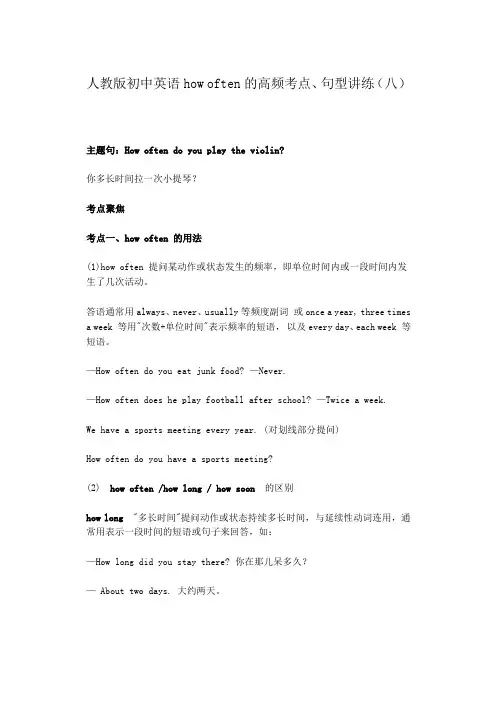
人教版初中英语how often的高频考点、句型讲练(八)主题句:How often do you play the violin?你多长时间拉一次小提琴?考点聚焦考点一、how often 的用法(1)how often 提问某动作或状态发生的频率,即单位时间内或一段时间内发生了几次活动。
答语通常用always、never、usually等频度副词或once a year, three times a week 等用"次数+单位时间"表示频率的短语,以及every day、each week 等短语。
—How often do you eat junk food? —Never.—How often does he play football after school? —Twice a week.We have a sports meeting every year. (对划线部分提问)How often do you have a sports meeting?(2) how often /how long / how soon 的区别how long "多长时间"提问动作或状态持续多长时间,与延续性动词连用,通常用表示一段时间的短语或句子来回答,如:—How long did you stay there? 你在那儿呆多久?— About two days. 大约两天。
how soon "(还要)过多少时间(才能……)"或"要多快能完成某动作或结束某状态" 常用于将来时态,通常用"in +时间段"(多久以后)回答,如:—How soon will you finish the work? 过多久你能完成这项工作?—In a week. 一周之后。
— How soon will the dinner be ready? 晚饭还要多久能做好?— In ten minutes. 十分钟之后。
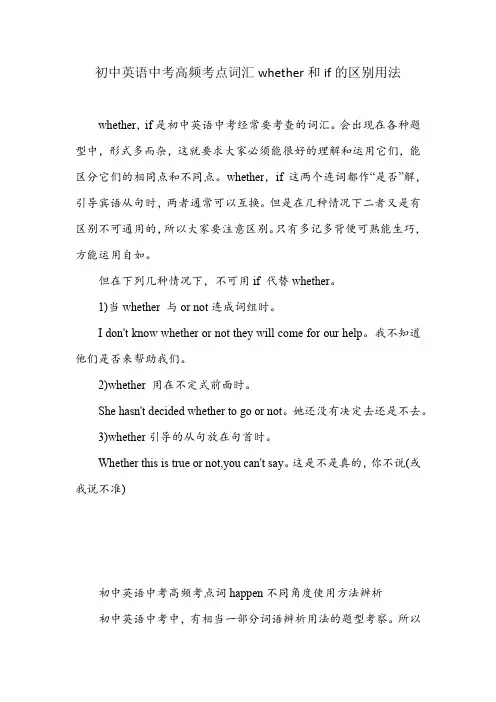
初中英语中考高频考点词汇whether和if的区别用法whether,if是初中英语中考经常要考查的词汇。
会出现在各种题型中,形式多而杂,这就要求大家必须能很好的理解和运用它们,能区分它们的相同点和不同点。
whether,if这两个连词都作“是否”解,引导宾语从句时,两者通常可以互换。
但是在几种情况下二者又是有区别不可通用的,所以大家要注意区别。
只有多记多背便可熟能生巧,方能运用自如。
但在下列几种情况下,不可用if 代替whether。
1)当whether 与or not连成词组时。
I don't know whether or not they will come for our help。
我不知道他们是否来帮助我们。
2)whether 用在不定式前面时。
She hasn't decided whether to go or not。
她还没有决定去还是不去。
3)whether引导的从句放在句首时。
Whether this is true or not,you can't say。
这是不是真的,你不说(或我说不准)初中英语中考高频考点词happen不同角度使用方法辨析初中英语中考中,有相当一部分词语辨析用法的题型考察。
所以这就需要大家在平时的学习过程中,注意区分一些意思相近的词语的用法。
因为英语中往往意思相近但是用法确有很大不同。
而“Happen”这个词就是一个中考经常考查的一个高频考点词汇。
往往从词语的搭配,主语的使用,发生的性质等方面去考查。
有时还要与take place 一起混搭出现。
所以大家在学习过程中一定要注意其如何使用。
现主要从主语、固定搭配使用、从句的角度来归纳一下happen的使用方法。
用法归纳“happen” 是不及物动词,意为“发生”,其后不能带宾语,它的主语通常是物,而不能是人。
其用法如下:1. 表示“某地(某时)发生了什么事”,常用“sth.+ happen +地点/ 时间”结构表达,此时主语应是事情.如:The story happened in a small village. 这个故事发生在一个小村庄.An car accident happened a moment ago. 刚才发生了一起车祸.2. 表示“某人出了某事(常指不好的事)”,要用“sth.+ happen+to sb.”结构表达。
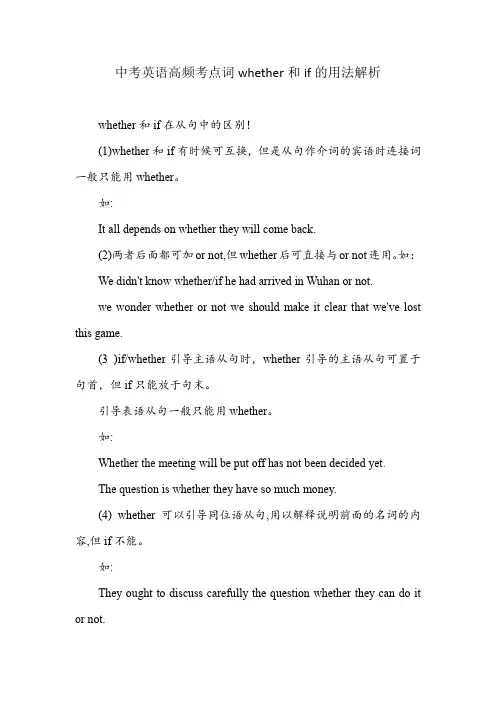
中考英语高频考点词whether和if的用法解析whether和if在从句中的区别!(1)whether和if有时候可互换,但是从句作介词的宾语时连接词一般只能用whether。
如:It all depends on whether they will come back.(2)两者后面都可加or not,但whether后可直接与or not连用。
如:We didn't know whether/if he had arrived in Wuhan or not.we wonder whether or not we should make it clear that we've lost this game.(3 )if/whether引导主语从句时,whether引导的主语从句可置于句首,但if只能放于句末。
引导表语从句一般只能用whether。
如:Whether the meeting will be put off has not been decided yet.The question is whether they have so much money.(4) whether可以引导同位语从句,用以解释说明前面的名词的内容,但if不能。
如:They ought to discuss carefully the question whether they can do it or not.(5)whether可与动词不定式连用,但if不能。
如:we have not decided whether to go.(6)whether可引导让步状语从句意思“不管…..(还是)" ,而if不能。
如:Whether he comes or not, I will begin our party on time.中考英语高频考点词work on等熟词搭配解析work 的熟词搭配是中考的一个高频考点,经常出现在各种选择完形填空或阅读中,所以大家一定要注意区分他们的用法。
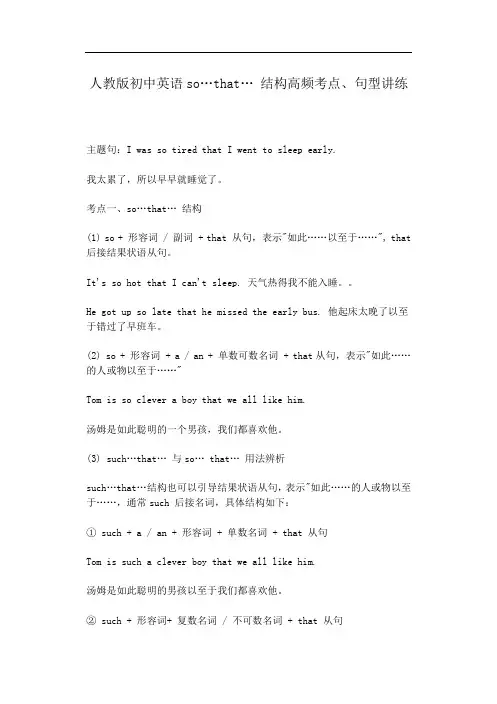
人教版初中英语so…that…结构高频考点、句型讲练
主题句:I was so tired that I went to sleep early.
我太累了,所以早早就睡觉了。
考点一、so…that…结构
(1) so + 形容词 / 副词 + that 从句,表示"如此……以至于……", that 后接结果状语从句。
It's so hot that I can't sleep. 天气热得我不能入睡。
He got up so late that he missed the early bus. 他起床太晚了以至于错过了早班车。
(2) so + 形容词 + a / an + 单数可数名词 + that从句,表示"如此……的人或物以至于……"
Tom is so clever a boy that we all like him.
汤姆是如此聪明的一个男孩,我们都喜欢他。
(3) such…that…与so… that…用法辨析
such…that…结构也可以引导结果状语从句,表示"如此……的人或物以至于……,通常such 后接名词,具体结构如下:
① such + a / an + 形容词 + 单数名词 + that 从句
Tom is such a clever boy that we all like him.
汤姆是如此聪明的男孩以至于我们都喜欢他。
② such + 形容词+ 复数名词 / 不可数名词 + that 从句。
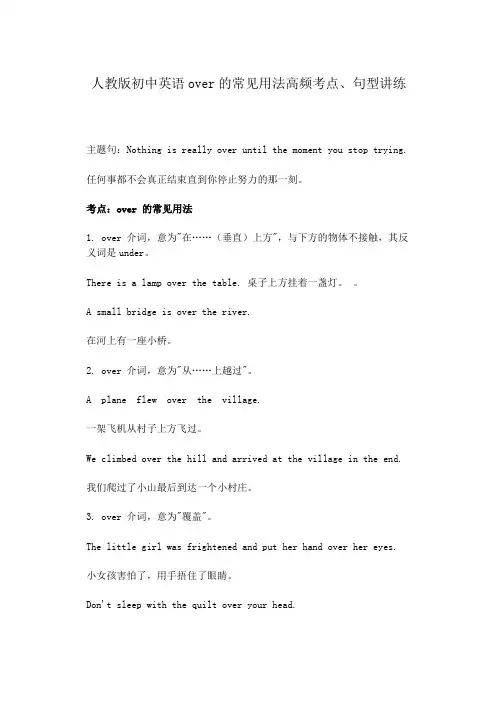
人教版初中英语over的常见用法高频考点、句型讲练
主题句:Nothing is really over until the moment you stop trying. 任何事都不会真正结束直到你停止努力的那一刻。
考点:over 的常见用法
1. over 介词,意为"在……(垂直)上方",与下方的物体不接触,其反义词是under。
There is a lamp over the table. 桌子上方挂着一盏灯。
A small bridge is over the river.
在河上有一座小桥。
2. over 介词,意为"从……上越过"。
A plane flew over the village.
一架飞机从村子上方飞过。
We climbed over the hill and arrived at the village in the end. 我们爬过了小山最后到达一个小村庄。
3. over 介词,意为"覆盖"。
The little girl was frightened and put her hand over her eyes. 小女孩害怕了,用手捂住了眼睛。
Don't sleep with the quilt over your head.。
![[全]人教版-中考英语高频考点、句型详解](https://uimg.taocdn.com/d95a87b079563c1ec4da719e.webp)
人教版中考英语高频考点、句型详解考点、动词be的完成时与动词go的完成时用法对比动词be和go的完成时是现在完成时中重要的知识点和高频考点之一。
1. 动词be的完成时的用法(1) have / has been to + 地点意为“到过某地(现在已不在那儿了)”,不能表示动作的延续,不能和表示一段时间的状语连用,不能用how long 提问,可以和ever, never, just等副词以及once, twice, three times 等表示次数的词连用,也可用how many times 提问“去过某地的次数”。
I have been to Beijing many times.我去过北京很多次了。
How many times have you been to a science museum?你去过科学博物馆多少次?He has never been to the Great Wall.他从未去过长城。
(2) have / has been in / at + 地点意为“呆在某地”,可以表示延续,常和表示一段时间的状语连用,能用how long 提问。
I have been in Beijing for several years.我已呆在北京几年时间了。
How long has he been at that school?他在那个学校多长时间了?以上用法中表示地点的是there、here、abroad 等副词时,介词to / in / at 省略。
He has been abroad for three years.他出国3年时间了。
How long have you been here?你来这多久了?(3) have / has been in + 表示组织、团体的名词,表示“加入某组织,成为其中一员”,可以表示延续。
I have been in the Party since 1996.从1996年开始我就入党了。
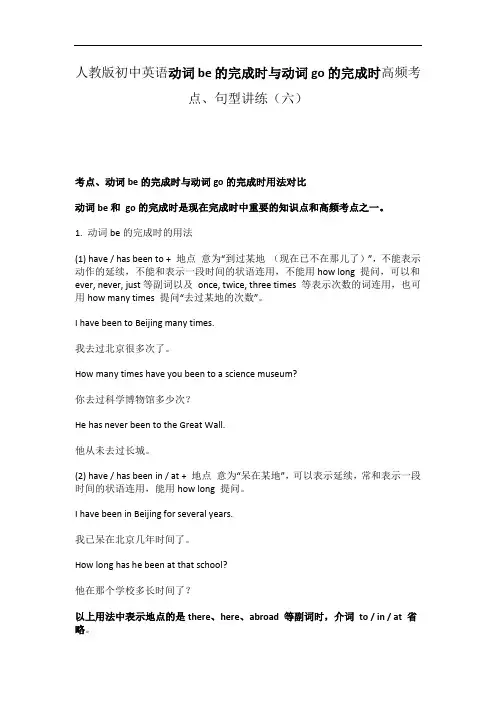
人教版初中英语动词be的完成时与动词go的完成时高频考
点、句型讲练(六)
考点、动词be的完成时与动词go的完成时用法对比
动词be和go的完成时是现在完成时中重要的知识点和高频考点之一。
1. 动词be的完成时的用法
(1) have / has been to + 地点意为“到过某地(现在已不在那儿了)”,不能表示动作的延续,不能和表示一段时间的状语连用,不能用how long 提问,可以和ever, never, just等副词以及once, twice, three times 等表示次数的词连用,也可用how many times 提问“去过某地的次数”。
I have been to Beijing many times.
我去过北京很多次了。
How many times have you been to a science museum?
你去过科学博物馆多少次?
He has never been to the Great Wall.
他从未去过长城。
(2) have / has been in / at + 地点意为“呆在某地”,可以表示延续,常和表示一段时间的状语连用,能用how long 提问。
I have been in Beijing for several years.
我已呆在北京几年时间了。
How long has he been at that school?
他在那个学校多长时间了?
以上用法中表示地点的是there、here、abroad 等副词时,介词to / in / at 省略。
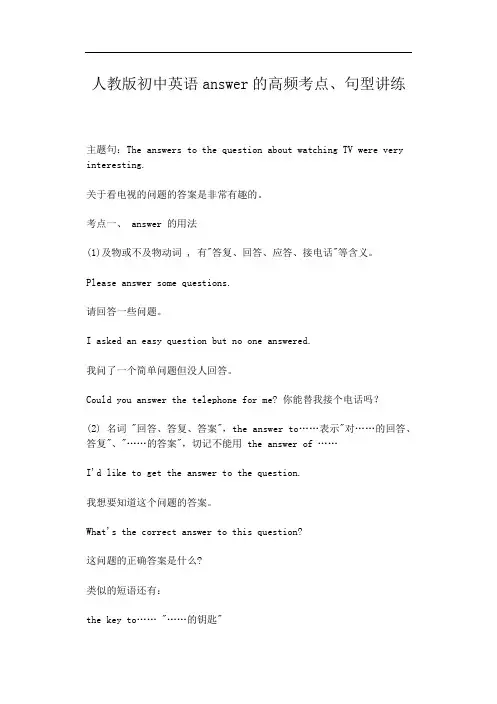
人教版初中英语answer的高频考点、句型讲练主题句:The answers to the question about watching TV were very interesting.关于看电视的问题的答案是非常有趣的。
考点一、 answer 的用法(1)及物或不及物动词 , 有"答复、回答、应答、接电话"等含义。
Please answer some questions.请回答一些问题。
I asked an easy question but no one answered.我问了一个简单问题但没人回答。
Could you answer the telephone for me? 你能替我接个电话吗?(2) 名词 "回答、答复、答案",the answer to……表示"对……的回答、答复"、"……的答案",切记不能用 the answer of ……I'd like to get the answer to the question.我想要知道这个问题的答案。
What's the correct answer to this question?这问题的正确答案是什么?类似的短语还有:the key to…… "……的钥匙"the solution to …… "……的解决办法"Can I have the key to the door?我可以有一把门的钥匙吗?He didn't know the solution to the problem.他不知道这个难题的解决办法。
考点二、watch 的用法(1) 名词 "手表",复数形式 watches。
(2)及物动词 "注视、观看"强调"专注地看",有欣赏的意味,常用于看电视、看球赛等。
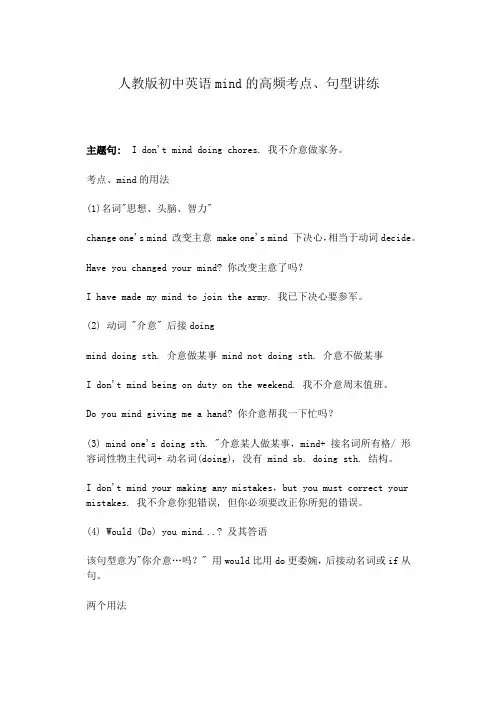
人教版初中英语mind的高频考点、句型讲练
主题句:I don't mind doing chores. 我不介意做家务。
考点、mind的用法
(1)名词"思想、头脑、智力"
change one's mind 改变主意 make one's mind 下决心,相当于动词decide。
Have you changed your mind? 你改变主意了吗?
I have made my mind to join the army. 我已下决心要参军。
(2) 动词 "介意" 后接doing
mind doing sth. 介意做某事 mind not doing sth. 介意不做某事
I don't mind being on duty on the weekend. 我不介意周末值班。
Do you mind giving me a hand? 你介意帮我一下忙吗?
(3) mind one's doing sth. "介意某人做某事,mind+ 接名词所有格/ 形容词性物主代词+ 动名词(doing), 没有 mind sb. doing sth. 结构。
I don't mind your making any mistakes,but you must correct your mistakes. 我不介意你犯错误, 但你必须要改正你所犯的错误。
(4) Would (Do) you mind...? 及其答语
该句型意为"你介意…吗?" 用would比用do更委婉,后接动名词或if从句。
两个用法。
人教版初中英语hope的高频考点、句型讲练
人教版初中英语hope 的高频考点、句型讲练
主题句: I hope to find out what's going on around the world. 我希望弄清楚世界各地正在发生什么事情。
考点一、hope 的用法
(1) hope 用作动词或名词,意为"希望、盼望"。
Try hard, never give up your hope.
努力,不要放弃你的希望。
(2) hope to do sth. "希望做某事",动词不定式作宾语。
I hope to win the game.
我希望赢得这次比赛。
What do you hope to do during the winter vacation?
在寒假期间你希望做什么?
(3) hope + that 从句,"期望 /盼望……"
I hope that you can make your dream come true.
我希望你能实现你的梦想。
He hopes that I can help him.
他希望我能帮助他。
九全1-2单元1.-How do you study for a test?你如何为考试而学习?-I study by working with a group.我通过小组合作学习。
知识点:询问及回答做事方式的句型1)对方式状语提问,用疑问词how.2)by doing...结构中,介词by意为“通过”,其后接动名词(短语),构成介词短语,作状语,常用来表达做某事的方式。
by意为“通过,以……的方式”。
后面接动名词或名词。
接交通工具时名词前不用冠词with意为“用,拿着,与……一起”。
后面可接表示工具或人物或身体部位的名词in意为“用”。
接表示语言或颜色的名词2.I 've put on five pounds!我已经胖了5磅了!知识点:put on 增加(体重);发胖1)put on的三种含义①增加(体重);发胖②穿上;戴上③上演2)put on 是动副短语,若其宾语是名词时,放在put与on的中间或其后面,若其宾语是代词时,放在put与on的中间。
【拓展延伸】常见由put构成的其他短语1)put up张贴;挂起;搭建2)put off 推迟;拖延3)put out熄灭;扑灭4)put away放好;收好3.One Christmas Eve, Scrooge sees the ghost of Jacob Marley, his dead business partner.有一年的圣诞前夜,斯克鲁奇见到了他已故的生意伙伴雅各布·马利的灵魂。
dead形容词,表示“死的;无生命的”。
die不及物动词,表示“死、死亡”。
dying die的现在分词,也可作形容词,表“垂死的,濒于死亡边缘的,枯萎的”之意。
death名词,表示“死、死亡”。
【温馨提示】die是非延续性动词,不能与表示一段时间的时间状语连用。
4.He warns Scrooge to change his ways if he doesn’t want to end up like him.他警告斯克鲁奇如果不想落到和他一样的下场的话就要改变他的方式。
人教版初中英语wonder的高频考点、句型讲练
主题句:I wonder what life was like in the past.
我想要知道过去的生活是什么样子。
考点一、wonder 的用法
wonder 动词意为"想知道;琢磨",相当于 want to know。
词形变化wonderful 形容词 "极好的,奇妙的"。
wonder通常接what/ where/ how /who / when 等疑问词或if 引导的宾语从句, 还可以接"疑问词+ 动词不定式"作宾语。
I wonder who broke the window.
我想要知道谁打破的窗户。
The teacher wondered why he was always late.
老师想知道他为什么总迟到。
He wondered what to do with these old books.
他想知道怎么处理这些旧书。
I wonder if you would give me a hand.
我想知道你是否愿意助我一臂之力。
考点二、句型 What +be +主语 + like ? 意为"……是什么样子"。
What's the weather like today?
今天天气怎样?。